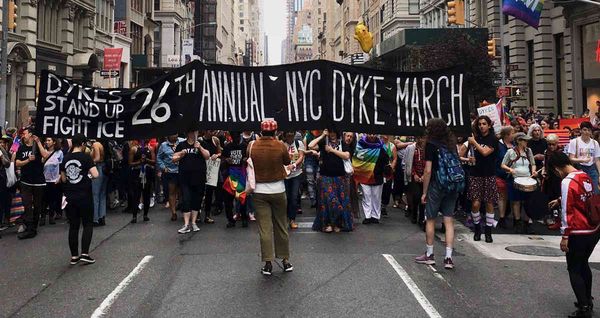Eye For Film >> Movies >> All We've Got (2019) Film Review
All We've Got
Reviewed by: Jennie Kermode

Alexis Clements' documentary, which screened at 2019's Newfest, opens with a reflection on the word lesbian. It's a word, says the filmmaker, that she seems to hear less and less. It represents a culture which seems to be diminishing; year by year, more of the iconic venues that woman worked hard to set up are closing down. She recognises that more women now identify as bisexual or identify simply as queer, reflecting a more complex perception of sexuality and even of gender. She doesn't resent them but it's simply not her world. With this, the stage seems set for a film that is either nostalgic or bitter, yet what unfolds is quite different. Setting out to explore the history of lesbian activism and the way that women who love women live and express themselves today, Clements discovers a story that is diverse, inclusive and profoundly optimistic.
It begins with reference to some of the founding organisations working to support lesbian rights in the US, the Lesbian Herstory Archives on the east Coast and the Daughters of Bilitis on the West. Interviews with key players and a visit to the current home of the Archives in New York City help to detail the work they did and how they succeeded in changing the game. The inclusion of Esperanza brings into focus the importance of intersectionality within the movement and the opening up of spaces for people of colour who faced different, more complex issues than their white peers. It also introduces the social justice narrative that would become intrinsic to this part of the movement, explaining how, from the very start, the outlines of that movement were fuzzy. On the one hand, it sometimes included women who were not in any way lesbian; on the other, it made room for butch lesbians some of whom did not identify as women.
As well as looking at organisations, the film looks at historically important venues such as New York's Wow Café, whose story it draws on to explore the intersection of lesbian activism, feminism and the arts. There's also a visit to the original Trans Ladies' Picnic (since adopted by many other cities) which created a safe space for women who didn't necessarily feel welcome elsewhere or who didn't have much money and, significantly, a place without alcohol. Coming at the end of the film, this invites viewers to look back and consider how much of the rest of it has revolved around drinking, and how easy it is to end up living that way as a lesbian or queer woman today, something that presents a dangerous temptation for those whose mental health has been compromised by traumatic experiences of prejudice.
Inevitably, that prejudice is referenced throughout - it has to be in order to put things in perspective for younger viewers who may not be aware how institutional it was in time past. Clements isn't interested in focusing on suffering, however. Her interest is in how communities have come together to create their own spaces and opportunities when denied room in the mainstream, and much of what this film details has the potential to be emulated elsewhere by new groups of people keen to do likewise. It's a history, it's a tribute to courageous individuals, and it's a how-to guide. It's also a very personal film both in its narrative an in terms of the contributions made by many interviewees. Like them, Clements has taken what she can find and built something that matters.
Reviewed on: 27 Oct 2019















